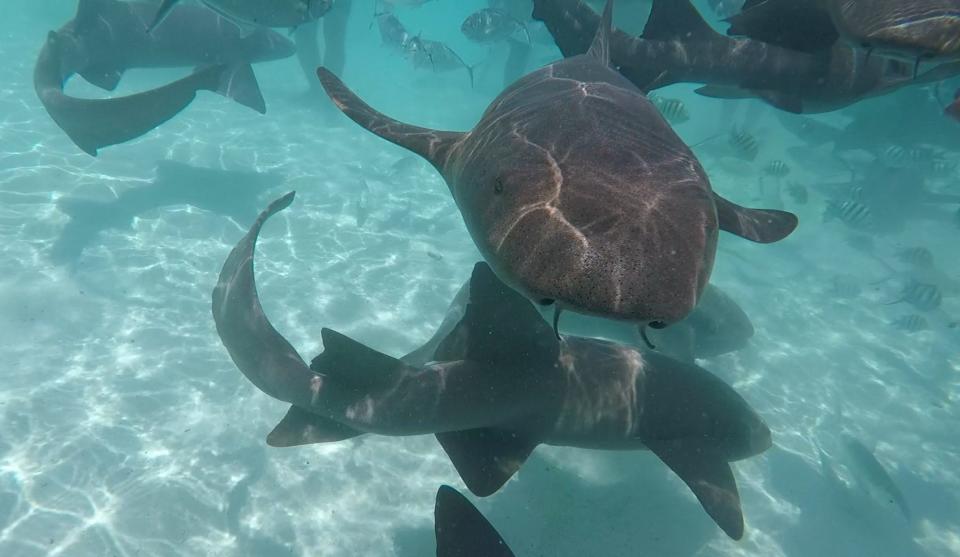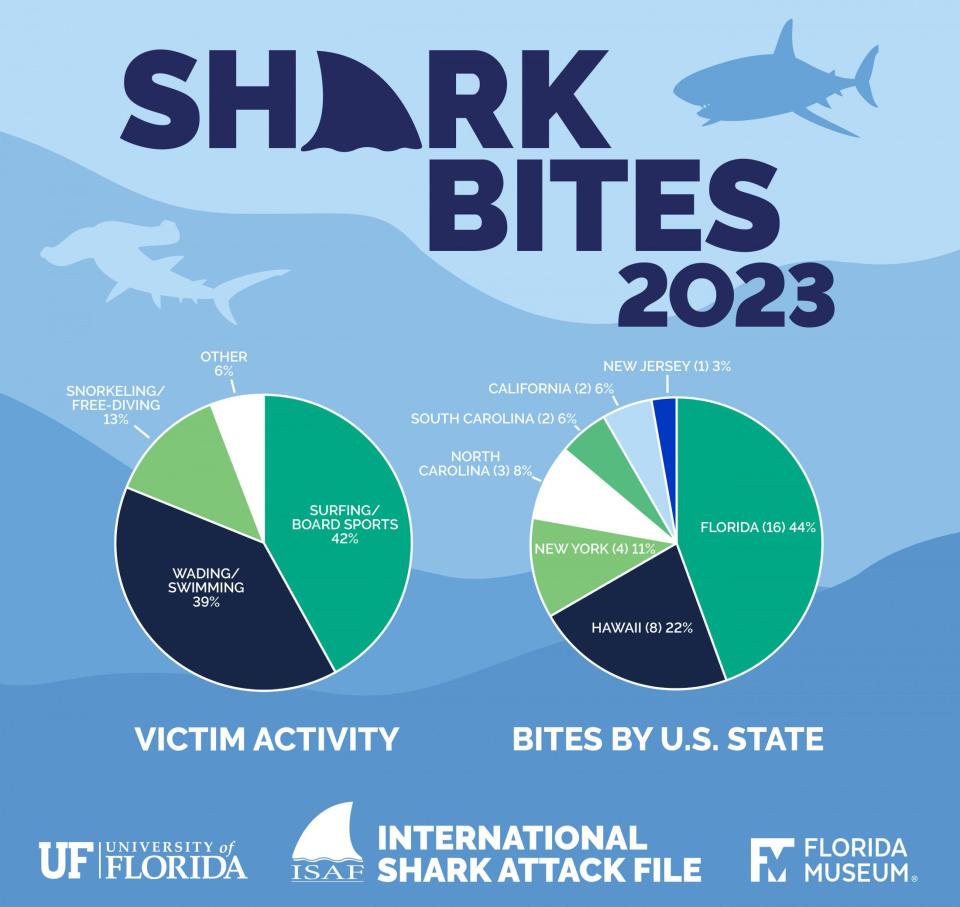You may know Volusia County is Florida's shark attack capital; how do Lee, Collier rate?
Scary as a shark encounter might sound, the danger is really the other way around. Humans biting sharks has caused much more harm, in terms of natural systems.
In Florida and worldwide, populations of reef sharks are dropping, according at a study published last year. Conducted over five years by Mote Marine Laboratory, Florida International University and a group of international scientists, it showed species like grey reef, blacktip reef, whitetip reef, nurse and Caribbean reef sharks.declined by an average of 63%.
That's bad news for the marine environment, especially coral reefs, where the sharks keep fish populations in balance.

Over the 142 years there's been an official count, sharks have bitten 16 people in Collier and Lee counties ‒ eight in each county, none of them fatally.
The most recent bite in either county was in May of 2007, when Edgewater Beach Hotel guest Hans Pruss was swimming about 100 yards off the Naples shoreline when he felt something bump him on the left leg.
Pruss swam to the beach and saw a circular bite from just above his left knee extending to mid-thigh. Emergency personal said the bite was probably caused by a 6- to 8-foot shark. He was treated and released from Naples Community Hospital.
Bob Hueter, then-director of Mote Marine Laboratory's Center for Shark Research told The News-Press at the time: "If you look at the statistics, you'll see that shark attacks are rare in Florida and exceedingly rare in Collier and Lee counties," he said. "It's such a statistical fluke that there's no reason to expect it will happen again any time soon."
He's been right for 17 years.
Vending machines, cars and lightning bigger worries than sharks
For Florida humans, the risk of death by shark is 1 in 4.3 million. You're much more likely to lose your life to lightning, a falling vending machine, being hit by a car on your way to the beach, or just drowning. So despite all the yearly shark hoopla that surrounds Discovery Channel's "Shark Week," as with the infamous Summer of the Shark in 2001, this and last year's shark bites aren't statistically anything beyond the norm.
Tell that to the three people injured in back-to-back shark attacks in waters off Florida's Gulf Coast on June 7. Two of the victims — an adult woman and a juvenile girl — were airlifted to hospitals. One lost half her arm.
According to Walton County Sheriff's Office:
A 45-year-old woman lost her lower left arm in the first attack, shortly before 1:15 p.m. in Watersound, about 15 miles up the Gulf Coast from Panama City Beach.
Two people were injured in the second incident at Inlet Beach between south Walton and Bay Counties. The victims, ages 15 to 17, were in waist-deep water about four miles from the first attack.
Lulu Gribbin, 15, had her right leg amputated to the middle of her thigh, and her hand is missing after the shark bit it off, her mother told media after the attack.
The incidents mark the first shark-related bites in Florida in 2024, according to trackingsharks.com.
Volusia and Brevard by far riskiest in Florida for shark bites
Despite this year's attacks in other counties, Brevard and Volusia are by far Florida's highest-risk counties for shark attacks, or "encounters," if not most of the world.
None have been reported yet this year in Brevard, while Volusia has reportedly seen four, including one on the Fourth of July and one the day after in New Smyrna Beach.

Most Florida shark bites are "nip-and-runs" from small sharks in the surf that mistake a foot for a fish. And east Central Florida is the perfect storm for more shark bites: ever-more people and surfers in the same paths as migratory and resident sharks.
Tracking a 10-foot great white Shark named Penny surfaces again in Gulf of Mexico, off Fort Myers Beach
But again, the odds of being bitten remain extremely low.
There was an increase in unprovoked shark attacks worldwide and an uptick in fatalities in 2023 compared to the previous year, according to University of Florida’s International Shark Attack File, a scientific database of global shark attacks.
Provoked attacks are when humans intentionally approach a shark or swim in an area where bait is being used to lure fish.
UF confirmed 69 unprovoked bites in 2023 and 22 provoked bites. There were 10 fatalities, including two in the United States; four in Australia; and one each in the Bahamas, Egypt, Mexico and New Caledonia. Although higher than the previous five-year average of 63 attacks, the data remain consistent with long-term trends, the UF researchers said.
“This is within the range of the normal number of bites, though the fatalities are a bit unnerving this year,” Gavin Naylor, director of the Florida Museum of Natural History’s shark research program, said in February, when the museum released its 2023 shark bite statistics, their most recent data.
Worldwide, shark attacks have been increasing each decade, according to the Shark Attack File, mostly because of more people in the water. But there is no indication of any change in the per capita rate of attack. Globally, 42% of bites involved surfers, with swimmers and waders a close second at 39%.
The United States had 36 unprovoked attacks, accounting for 52% of incidents worldwide. Of those, two — one in California and another in Hawaii — were fatal. As usual, Florida had more shark bites than any other state, with 16 attacks.
To put that in perspective, UF also cites the following risks of dying by other means:
Lightning: 1 in 79,746
Drowning: 1 in 1,134
Car accident: 1 in 84
Flu: 1 in 63
Hospital infections: 1 in 38
While the overall risk of being bitten by a shark is extremely low, the highest rate of shark bites in Florida is by far in Volusia, Brevard and Indian River counties. In 2012 research paper, Raid Amin, a professor of at University of West Florida's math and statistics department, found east Central Florida's rate of shark attacks was 9-fold the rest of Florida.
Amin analyzed the shark bites with software typically used to identify geographic cancer clusters and other disease hotspots.
That said, there are things people can do — or not do — to lower a low risk to even closer to zero. Swim in groups, not when it's dark, not when there are tons of baitfish jumping in the water, or near lots of surf fishermen, for example.
About 1 in 3 of Florida's shark attacks happen in August and September. Those two months bring massive schools of mullet, anchovies, herrings, and sardines migrating along Brevard County and other east Central Florida beaches. Blacktip, blacknose, spinners and sandbar sharks follow by the hundreds to pick off their meals.
But scientists say sharks are way more scared of ― and in danger from ― us than we are of them.
"They're all very, very skittish," said Toby Daly-Engel, an assistant professor and shark researcher at Florida Institute of Technology. "Sharks are very, very cautious animals. They'd rather scavenge something dead than hunt," she added.
"They're more like wolves, very cautious," Daly-Engel said. "We are not their food."
Contributing: Jim Waymer, C.A. Bridges, Anthony Robledo, Collin Bestor, Amy Bennett Williams and Cheryl McCloud
How to avoid a shark bite?
Swim with a buddy. Most sharks are more likely to approach a solitary person.
Stay close to shore.
Be careful around the area between sandbars or near steep drop-offs, both popular shark hangouts.
Stay out of the water at dawn or dusk when sharks are more active and feeding.
Avoid shiny jewelry or reflective swimwear that might resemble the sheen of fish scales.
Avoid areas where people are fishing or areas with known effluents or sewage.
Stay away from areas with diving seabirds.
Be careful in murky water. Some shark species may not see you very well either, and there can be confusion.
Try not to splash too much, especially in a single spot. Sharks may investigate to see if you are a fish in distress.
If you see a shark, slowly and calmly get out of the water.
This article originally appeared on Fort Myers News-Press: Shark attacks in Florida: How dangerous are Lee and Collier counties?

